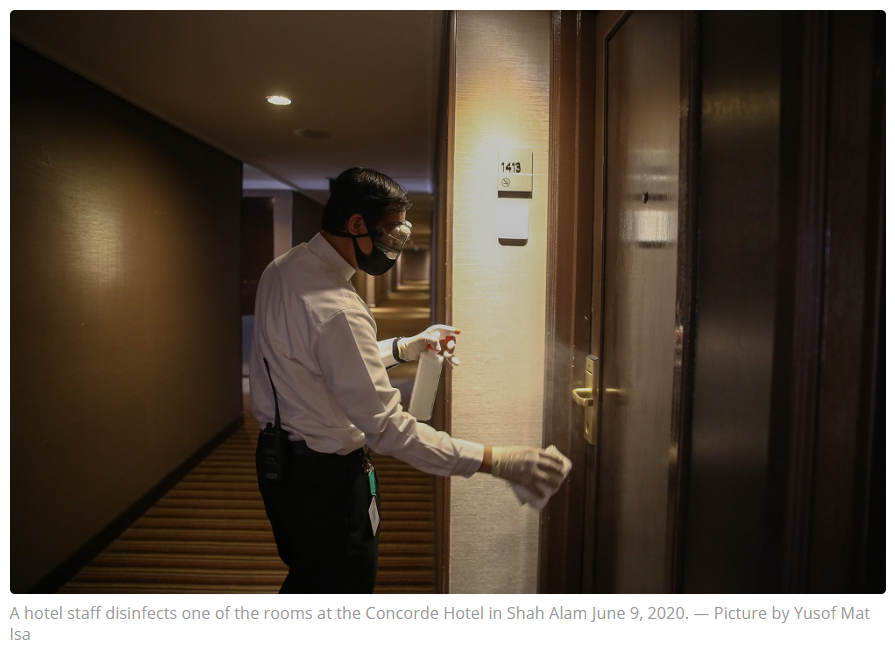As Malaysia enters RMCO, hospitality industry captains push for borders to be reopened to travellers from ‘low-risk’ nations
KUALA LUMPUR, June 10 — Local hoteliers and others in the tourism industry are hoping the government will establish travel bubbles with countries considered low-risk for Covid-19 sooner rather than later to help boost Malaysia’s economy.
Many in the business are treading water today, reeling from the impact of the coronavirus pandemic that has forced some into closure barely three months after the movement control order began — throwing a wrench into the Visit Malaysia Year 2020 campaign.
Despite the government’s latest move to allow interstate travel again under the recovery movement control order (RMCO), several in the business whom Malay Mail spoke to were apprehensive about relying solely on domestic travellers to sustain their respective industries in the immediate future.
“The soft landing approach would gear the industry towards full recovery.
“The industry is still cautious despite the easing of domestic travel as it still depends on international arrivals in the long run. Most of the cost management controls are still in place, to ensure a sustainable operation until tourism fully recovers,” Malaysian Association of Hotels (MAH) chief executive Yap Lip Seng said.
Noting that many countries were similarly affected by the pandemic, Yap does not see an immediate growth spurt to globetrotting activities once other governments reopen their borders.
He cited MAH’s survey of 402 Malaysian hotels nationwide conducted last month on their contingency plans and industry forecast.

Interestingly, the survey found that domestic tourists made up 55 per cent of Malaysia’s tourism market, with the remaining 45 per cent coming from international visitors.
However, the same survey saw Malaysian hotels predicting a 27 per cent decline in the Average Daily Rate for their rooms in the next six months to a year, even though nearly a quarter (24.2 per cent) disclosed that they have received bookings for the second half of 2020.
Yap believes that in the future, demand for hotel rooms will be from two main groups: business travellers in need of accommodation due to work related travels, and couples. Larger family groups are less likely to pick up so soon considering the Covid-19 risks to the elderly and young children.
Malaysian Association of Tour and Travel Agents (Matta) president Datuk Tan Kok Liang estimated Malaysia’s tourism revenue for last year — before the Covid-19 outbreak — at about RM85 billion, adding that his sector was largely dependent on foreign visitors rather than locals.
Like Yap, Tan fears for its sustainability in the foreseeable future and hopes the government will relook its border control policy soon and not wait till August 31 — the projected end date for the RMCO.
Tan had previously voiced hopes that the government would gradually open up Malaysia’s borders to its Asean neighbours, as well as allow for the resumption of travel between countries he suggested to be at low risk of Covid-19, naming as examples Taiwan, Vietnam, Brunei and Australia.
While he said Malaysian tour agencies had largely escaped closure during the MCO prior to the shift into recovery mode, many Matta members were forced to ask their staff to take unpaid leave between March and May, or retrench them.
He said that for tour agencies, the staff payroll accounted for 60 per cent of costs.
Enticing Malaysian tourists with value-added deals

With their survival on the line, Tan said Matta members have come up with several value-added packages to entice Malaysians into travelling now that interstate movement is allowed. These include those geared towards nature, adventure and private tours to be in line with the government’s new guidelines and social distancing requirements to prevent the spread of Covid-19.
For MAH, Yap said some members have drawn up hotel packages that seek to provide guests with more experiences than just discounts on room rates. These include a wider option for dining, in-room facilities and entertainment options.
“Promotions that the hotels are currently offering are targeted at direct bookings with the hotels, either through their own websites or by calls/ walk-in.
“The promotions are add-value based, to give more to guests rather than just discounts.
“Some hotels have introduced flexible and 24 hours turnaround stays to attract travellers, giving them the option of checking in at any time, and enjoying their stay for the entire 24 hours,” Yap said.
Source: https://www.malaymail.com/news/malaysia/2020/06/10/as-malaysia-enters-rmco-hospitality-industry-captains-push-for-borders-to-b/1873967


 English
English




